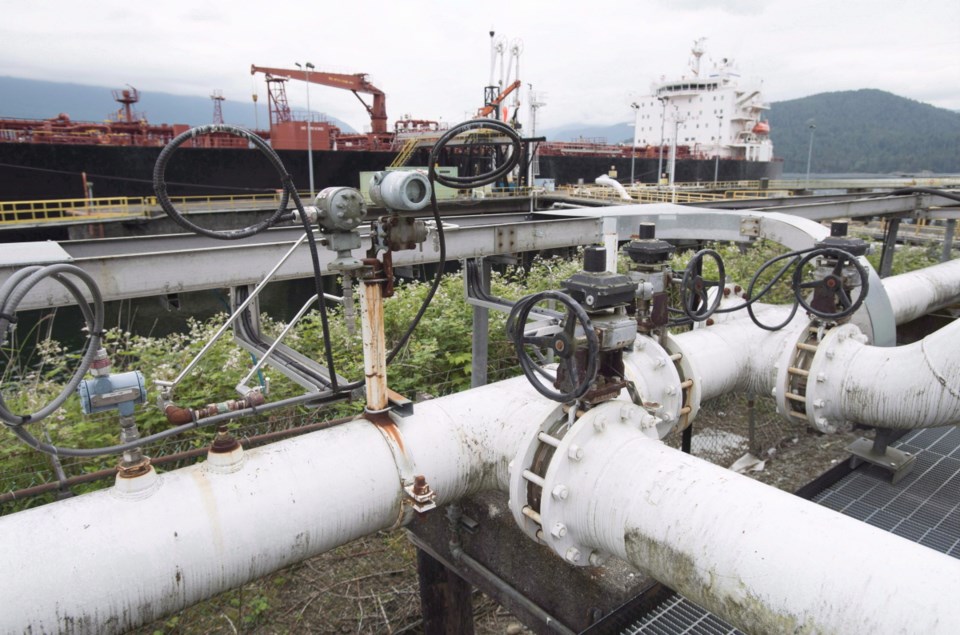A federal panellist collecting input on Kinder Morgan’s proposed pipeline expansion says it’s hearing widespread concern in B.C. about the project.
Kim Baird is one of three members of the Trans Mountain Expansion Ministerial Panel tasked with finding perspectives that might not have been heard during the National Energy Board’s consultation process.
“Very few people, if any, have stood up in favour of the project [in B.C.],” she said.
The panel has hosted 44 meetings in 18 days in Alberta and B.C., she said. It makes its final stops in Victoria on Monday and Tuesday.
“Our mandate is to canvass the public and stakeholders and indigenous groups about issues they have with the NEB process and whether it left out anything it shouldn’t have,” Baird said.
“What we’re hearing is that there are many concerns about the NEB process, that it excluded some important areas that people thought should have been examined more fully. We heard concerns about participation in the process itself, concerns about First Nations consultation, that it hasn’t been adequate.”
The $6.8-billion Trans Mountain Expansion Project would triple the capacity of an oil pipeline running from Edmonton to Burnaby to 890,000 barrels a day. Related tanker traffic past Vancouver Island would increase seven-fold as a result, to 34 tankers a month from five.
The existing pipeline, which has been operational since 1953, is the only pipeline from Alberta to the Pacific coast, sending oil directly from the oilsands to ships bound for foreign markets.
The project received conditional approval from the National Energy Board in May. The federal Liberal government created the ministerial panel to help inform its final decision on the project, anticipated in December.
There have been about 1,600 attendees and 500 presenters at panel hearings so far in nine communities, Baird said. About 16,000 have submitted feedback online.
“Typically, there was more economic support when we were in Alberta and much more environmental concern when we got to B.C.,” she said.
The panel will bring its findings to the federal Liberals, but will not make any recommendations.
Many have argued the project doesn’t have the social licence, or public acceptance, to go through.
And while the National Energy Board process has been criticized for leaving some voices out, the panel itself — along with the Ministry of Natural Resources that it reports to — has been criticized for the same thing, by not adequately advertising itself or inviting participants.
Contacted on Friday, Mike Hicks, who is the Capital Regional District’s Juan de Fuca electoral area director, said he was unaware of Monday’s meeting.
“No one in the world has invited me to come and give the thoughts of the Juan de Fuca area, and that’s sad,” Hicks said.
Hicks was part of a CRD delegation that put forward a request for tug -oat escorts to help guide the tankers through the Salish Sea. Kinder Morgan incorporated that into its proposal, which Hicks considers a win.
While more of his constituents work in the oilsands than in forestry these days, Hicks said, the vast majority are opposed to the project and would prefer no tanker traffic at all.
“The potential of an oil spill is just so devastating for our area,” he said.
Victoria Mayor Lisa Helps will give the same presentation that the National Energy Board panel saw, with a clear message: “We do not want a pipeline expansion; we do not want more tanker traffic.”
The coastal environment is the capital city’s greatest asset and a spill would be devastating to its economy and well-being, she said.
Several environmental groups plan to hold a demonstration in front of the panel’s hearings Tuesday at 3:30 p.m.
“The process in general has been a challenge and has been deeply flawed,” said Tim Pearson, director of communications for Sierra Club of B.C. “This panel doesn’t fix that.”
Two days of meetings
The Trans Mountain Expansion Ministerial Panel will host meetings in the Pacific Ballroom at the Marriott Inner Harbour Hotel, 728 Humboldt St. All meetings are public.
• Monday — First Nations, 9 a.m.-noon; local governments, 1:30-3:30 p.m.
• Tuesday — Environmental NGOs, 12:30-3 p.m.; town hall, 4-8:30 p.m.



